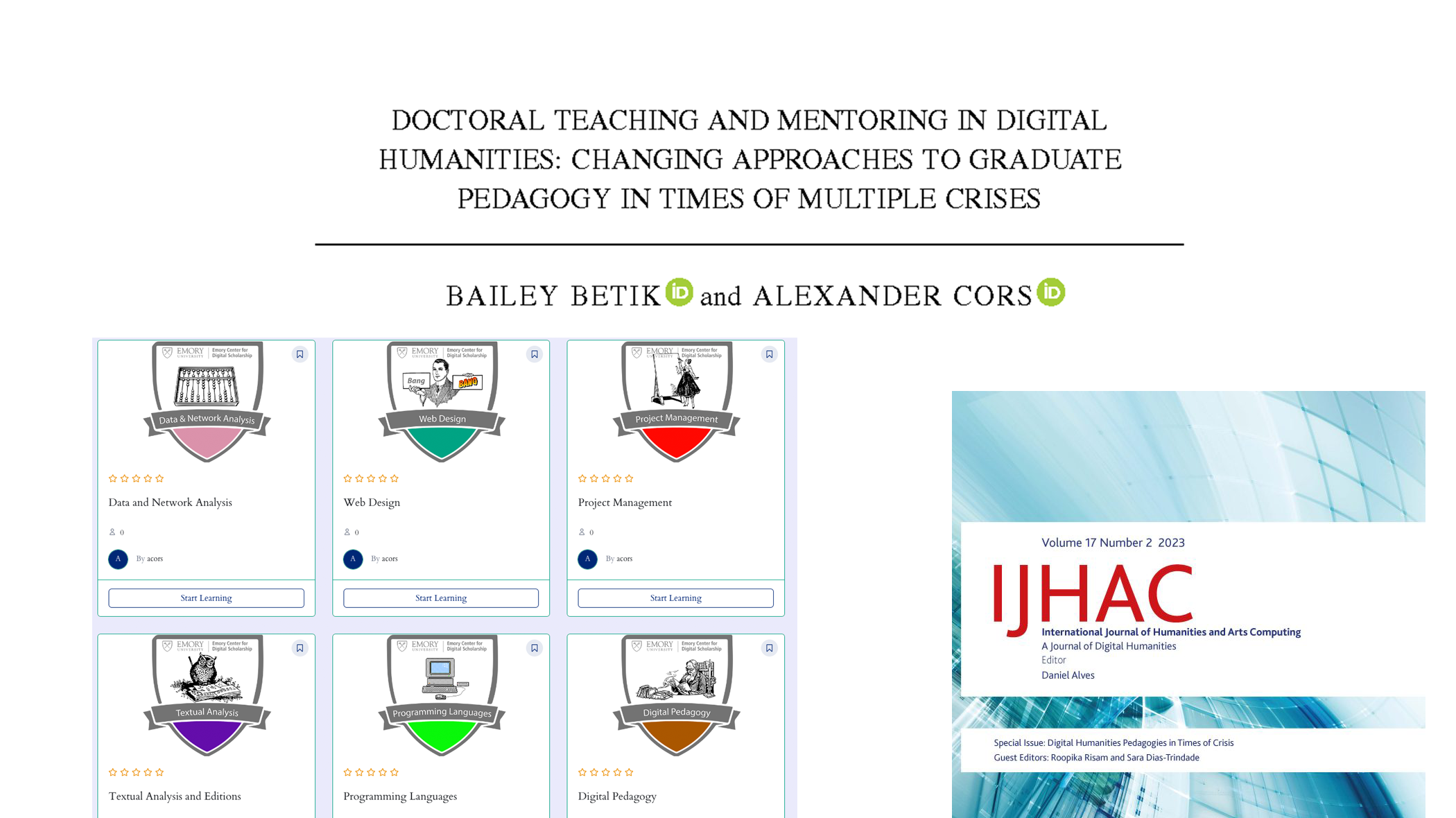Graduate training and mentoring are one of the core missions and strengths of the Emory Center for Digital Scholarship. The two dozens graduate student workers at ECDS gain experience working on collaborative project, learn new digital tools and methods, and participate in hands-on workshops for their professional development. Our staff is constantly rethinking, developing, and updating programs and opportunities for Emory’s students, adapting our offerings to the evolving needs and demands of graduate students and employers. ECDS Team members Dr. Bailey Betik and Dr. Alexander Cors recently wrote an article about Changing Approaches to Graduate Pedagogy in Times of Multiple Crises, which is now available in the new issue of the International Journal of Humanities and Arts Computing. You can read an excerpt below or go directly to the article here.
 and Sara Dias-Trindade
and Sara Dias-Trindade  , 17, no. 2 (October 1, 2023): 132–46. https://doi.org/10.3366/ijhac.2023.0309.
, 17, no. 2 (October 1, 2023): 132–46. https://doi.org/10.3366/ijhac.2023.0309.
Excerpt:
Another day, another crisis. As digital scholarship (DS) practitioners at the Emory Center for Digital Scholarship with PhDs in the humanities (English and History, respectively), we have found the discourse in recent decades about the state and directions of our disciplines and other humanities fields to be bleak, to say the least. The scarcity of secure employment, the imbalance in the number of PhDs received each year compared to available jobs, and even the closure of whole departments or universities serve as warning signs to fields that have been heralded as ‘dying’ since at least the 1980s. In 2012 Erica McWilliam lamented that today ‘“higher” education is more important and less relevant than ever’. And yet, for disciplines that have apparently been in a perpetual crisis for at least 40 years, the humanities remain surprisingly long-lived.
Nevertheless, the last couple of years added a whole new dimension to already strained working conditions. Since 2020 we have experienced a global pandemic, economic downturn, rising unemployment rates, political instability and reckonings with racial justice, especially within institutions of higher learning. As recent graduates (2022 and 2023), our doctoral careers were immediately impacted by the very crises discussed in this edited volume – crises that were even harder for peers from marginalized populations. We taught and were taught in the midst of COVID-19’s Zoom University graduate seminars; we wrestled with questions of how we could effectively incorporate activism and space for emotion in our own classes, research and graduate communities amid ongoing social justice movements and racial reckoning; we prepared for and took qualifying exams, wrote dissertations and went on the job market on graduate stipends among the mounting pressures of recession and inflation. Our research plans were disrupted and changed, and our postgraduate employment options looked even bleaker than pre-COVID.
Our aim here is not to add our voices to the swansong of the humanities. As Sidonie Smith summarizes the response of academic humanists to the question ‘What is to be done?’, ‘Some put their heads in the sand and bemoan crises that are just too big and intractable to tackle.’5 We see no use to the head-in-the-sand response to Smith’s query, responding instead with the urgency of action the crises of job market, COVID-19 and social justice demand. The only response to these immediate crises of labour, health and institutionalized racism must be rooted in postcolonial, intersectional understandings of graduate students’ varied lived experiences – fittingly, their ‘humanities’.
In this article, we share examples from the Emory Center for Digital Scholarship’s (ECDS) initiatives to prepare members of the graduate community for tackling the multitude of crises mentioned above. While many studies have focused on the impact of COVID-19’s pandemic pedagogies on undergraduate students, student bodies writ large, or faculty, graduate student training often goes overlooked in general in critical analysis, including analysis of pandemic effects. Below we will discuss how graduate-centred programmes like the Digital Scholarship Training Program (DSTP), teaching intensives like Emory Foundations for Online Teaching (EFOT) and Technology in Pedagogy, Curriculum, and Research (TPCR), and the ECDS training website give graduate students opportunities to practise being ‘both collaborators in production and self-reflexive users of technology, rather than passive consumers’. Moving beyond the immediate benefits of our training programmes to effectively triage responses to COVID-19 crises, these internships, intensives and online repositories offer graduate students a variety of formats to help mitigate inequities of time, space and access. While our case studies are specific to the graduate population at Emory University, we maintain that sustained initiatives towards digital humanities (DH) training and pedagogical workshops are not optional value-adds to doctoral education, but crucial components to addressing the lived reality of academic work – a lived reality that includes employment as equally as valuable as academic pursuit – in 2023.
We see DS centres as important and innovative spaces for graduate education: ideal places to develop, test and adapt programmes geared at teaching and improving professional development for students. Institutes like ECDS work collaboratively to explore possibilities for digital scholarship. We provide consulting expertise, project coordination and a technology-rich collaborative space for faculty, staff and students to incorporate digital tools and methods into research, teaching and publishing. Our multidisciplinary team of subject-matter experts – both full-time employees and students – creates innovative, sustainable and accessible projects and models of digital scholarship and pedagogy for academic and public use ‘that benefit the humanities community as a whole’. Within the ECDS, graduate students play an integral part in maintaining the centre’s various offerings from digital publishing, to teaching, to various short or long-term project consultations.
Read the rest of the article here.
